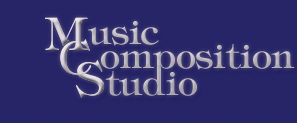How to notate songs
There are very few people per month who search on how to notate songs. The tools I have show under 100 people per month search on how to notate songs.
If you've found this page through a search engine, then you are one of those people.
In our "instant society," many people want "instant" results. By searching and finding information on how to notate songs, my guess is that you understand that the turtle wins the race, that the process is at least as important as the goal, and that knowledge and competence are a kind of "nourishment" in and of themselves.
Knowing how to notate songs gives a composer a sense of confidence and competence. It also makes it more possible for your songs to be popular 100 years from now, should they not be popular right now.
It relieves a lot of pressure to put one's musical thoughts down on paper, since the "reality" of the musical imagination takes written form.
What I mean is that if you write a song without notating it, the song is present in your sonic imagination and in your reality (because you can play it), but it does not exist in a codified form. While you can capture the song by recording it, the song is still a part of "oral history," and not a part of "written tradition."
Had Mozart never written his works down, they would be lost.
Songs not written down have a different quality of permanence, and in my opinion, are likely to be perceived as less permanent, even less worthwhile in the future.
Songs written down by arrangers, but authored or "created" by someone incapable of writing music basically go through a filter. The notation isn't written by the author, so the person notating the song essentially filters the song for everyone who wants to play it later.
If you look at Bob Marley's Greatest Hits, for example, you find that the written notation is basically a piano reduction. If you play the music as written, you get an inaccurate perception of the music. You have to hear the music in order to play it correctly...or even in the intended style. Of course, it's better to have something than nothing, and the notation does serve a purpose to capture and copyright the music. But the score doesn't really represent Bob Marley's intent.
One can go on and say that no lead sheet is really complete, and that's true. Just the melody and chords don't adequately describe what the music sounds like. For example, a lead sheet with the melody and chords does not describe what rhythm the rhythm guitar should play...or even if the song calls for a rhythm guitar or not.
Yet the melody and chords do provide the "skeleton" of the song, and the more detailed you get in your score, the more accurately others can replicate your musical intent.
To learn how to notate songs, I recommend my eBook "How to Write Your Songs Down!"
